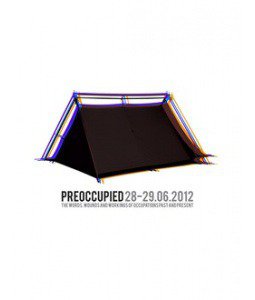Preoccupied
dal 27/6/2012 al 28/6/2012
Segnalato da
Abdollah Karimzadeh
Alex Casper Cline
Amr Ahmed
Ana Baeza Ruiz
Antonia Levy
Aurore Fauret
Carolyn Kraus
Catrinel Popa
Gabriel Zacharias
Christy Wampole
Giovanna Laterza
H. James Gilmore
Jacob Blumenfeld
Jens Koed Madsen
Jessica Carriere
Marilee Rust
Mathew Staunton
Merrill Cole
Paul Farber
Paul Kneale
Rebecca Dolgoy
Romain Tiquet
Trude Renwick
Veda Popovici
Vinicius Spricigo
Tiago Machado
Boaz Levin
Brice Bourdet
Emma Davenport
Sophie Nathan
Omri Livne
Maria Juliana Byck
Ryan Jeffrey
Sergio Racanati
Christian Berkes
Kenton Card
Aylwyn Walsh
Myrto Tsilimpounidi
Claudia Becker
Giorgos Papadopoulos
Jack Henrie Fischer
27/6/2012
Preoccupied
KW Institute for Contemporary Art, Berlin
The words, wounds and workings of occupations past and present. The conference brings together thoughtful, engaged people, people who considered themselves activists, artists and academics.

There are but two of us planning PREOCCUPIED. We are both PhD students in an Erasmus Mundus Joint Doctorate called Literary Interzones. We’re from opposite ends of Canada and our names are Jocelyn and Samara. We’re looking forward to meeting you all.
The idea for the conference was hatched around a kitchen table in Bergamo, Italy. It was late November. We were watching with envy everything that was happening on Occupy Wall Street and wanted so badly to be there. We were (and are) in an academic program, but we were both deeply suspicious about the academy and its separation from the world. At the same time, it seemed that rigorous thought must be able to contribute positively to the future of political engagement. We wanted to create a conference that would bring together thoughtful, engaged people, people who considered themselves activists, artists and yes, academics.
Since then, the streets of Quebec have erupted in protest. Those are the streets that educated us. Those are the institutions that trained us. At home, civil disobedience is on the rise. At the same time, funding for projects we hold near and dear has quietly slipped away. The democracy that celebrates protest and the funding that celebrates divergent voices clash more and more with institutions who ought to protect the right to speak, assemble, and publish. In planning PREOCCUPIED we have faced similar obstacles. For us, the practical concerns of paying for a conference have faced head on our ideological commitments to accessibility and openness.
By mid-February, we had received over 60 applications for PREOCCUPIED. By mid-April, we had heard from the last of our would-be funders. Much to our disappointment, and not for lack of trying, we received no institutional funding for the conference. Despite that, we forged ahead because the timeliness, location, and above all the quality of our keynotes and presenters had come together so beautifully we hated to give up. This has meant that the conference costs are being covered by attendance and participation alone.
Without institutional support, the conference has become a crowd-funded event: it is the result of the good will of many. We have tried to straddle divergent worlds: that of institutions and that of the street. The result has been a double-edged sword: academia tied us on the one hand to costs and mores foreign to the occupy movement but offered us, on the other, the kind of rigorous thought for which we have been so hungry. Similarly, the mores of Occupy set a moral course that felt at odds with the unspoken norms of academia. PREOCCUPIED is the awkward child of discordant visions. The balance we hope to strike has yet to find its centre; it probably never will.
For June 28-29, conference presentations will be free and open to all.
The complete programme is on the web site.
KW Institute for Contemporary Art
Auguststraße 69 - D-10117 Berlin



